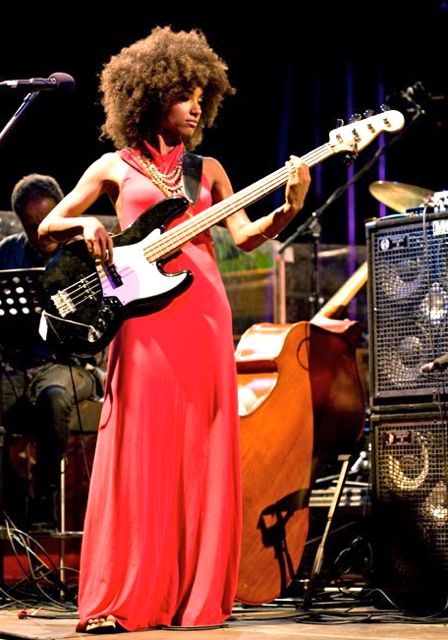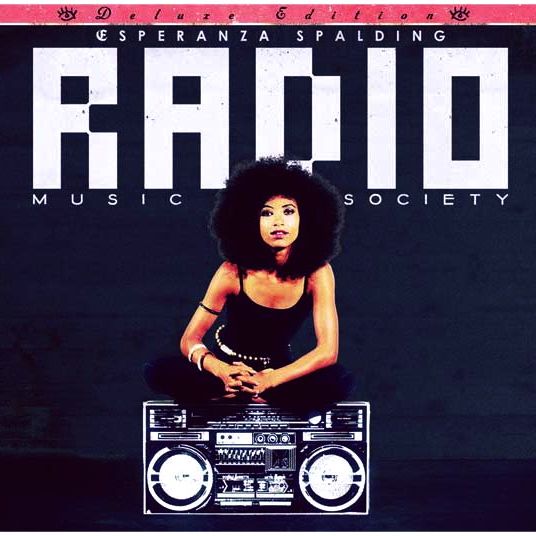SUMMARY
This is AI generated summarization, which may have errors. For context, always refer to the full article.

MANILA, Philippines – It doesn’t matter who you are or where you are, really, but American jazz bassist-vocalist-composer Esperanza Spalding could be singing about you.
You could be at your office secretly wishing to escape through the fire exit, or alone in a crowd of strangers praying for a friend to find you.
You could be a lover, a mother, a freedom-fighter — indisposed, or constantly inebriated.
Whoever you are or whatever it is that you do, these songs could be about you.
“The words are speaking to you as if they knew you,” Esperanza croons in “Radio Song,” the first track off her “Radio Music Society” album.
Her 4th solo album, Radio Music Society, is a take-off from her 2011 Grammy win.
She is not only the first jazz artist to win the Best New Artist category of the said awards; she also managed to outshine more popular contenders like rapper Drake, Florence and The Machine, Mumford & Sons and, yes, even Justin Bieber. Esperanza clearly shows us that her genre is not and should never be considered a relic.
Notwithstanding angry Bieber fans who inserted death threats into her Wikipedia profile the night of her Grammy win, this 27-year-old is considered by older jazz artists as the hope for their kind of music.
“She is one of the most pure and more sterling representations of what jazz should have developed toward,” 52-year-old jazz saxophonist Greg Osby told The New Yorker in 2010.
“She’s saying, ‘I’m a young person, I’m coming up in the so-called post-hiphop generation.’
“She’s informed by music videos, the Internet and digital immediate global access. Her music is representative of that, as opposed to somebody her age trying to sound like they were at their peak in 1945 or 1959.”
And if winning a Grammy (or the fact that she performed for President Barack Obama for the Nobel Peace Prize and toured with Prince) still can’t convince you that she is indeed the new hope of jazz music, then it just might be worth your while to have a listen to Radio Music Society.
‘This song’s the one’

A companion release to her 2011 album “Chamber Music Society,” this new album is accessible even to non-jazz listeners.
As with her previous endeavors, Esperanza stays true to her roots yet is unafraid of ticking off purists by spiking her music with pop sensibilities.
Her music is like a cocktail with a little bit of hip-hop and a pinch of ‘80s electronic, mixed in with heavy doses of RnB, soul and funk.
What you get is a contemporary jazz intoxication, with Esperanza as your dealer.
Her voice, soulful and velvety, lures us to listen to stories that could be about the people we know — they could even be about us. These tales range from love and loss, to those that are socially relevant, tackling issues like war and injustice. For sure, though, there would be one that is meant exactly for you.
And, as Esperanza promises in the album’s first track (Radio Song): “[As] soon as you hear it, the words are speaking to you as if they knew you. This song’s the one.”
An easy pick for yet-to-be-converted non-jazz listeners is the effervescent love song “Crowned and Kissed,” co-produced by hip-hop artist Q-Tip. The song is made notable by Jeff Galindo’s sexy trombone solos, as Esperanza coaxes: “My kisses are your crown, and I’m your queen. So now, lay with me, my king, I’m here to love you.”
What could be an instant favorite, though, is “Hold on Me.” It’s a track that speaks of what most people are enslaved to: secret longing. The opening lines should be indicative enough of the emotive high that is about to hit you: “I can hold my tongue for years, I don’t mind.”
With words laid out in classy big-band music (featuring 71-year-old iconic jazz drummer Billy Hart), it’s a song best taken with a shot of bourbon or single malt.
“Silent, I recite thousands of poems about you until one of them comes true.”
Take two shots of whiskey, then.
Watch Esperanza Spalding perform live here:
Inserted in between tracks of love and longing are social commentary songs that may come as a surprise. All set in smooth jazz and Esperanza’s soft voice, you wouldn’t instantly recognize the powerful meaning behind them until you listen closely.
“Vague Suspicions,” for instance, is a track tempered by Ricardo Vogt’s relaxed guitar riffs, with equally laid-back Rhodes piano undertones by Leo Genovese. Its lyrics, however, is a stark contrast of how the music might make you feel, as it tackles war and prejudices against the religion of Islam: “May this war end, Insha’Allah, he knelt to pray. When a dusty troop misjudged and blew him away.”
The same song also takes a jab at how the media is covering armed conflicts; she thinks some can be too cold and pragmatic “On the neon news they won’t be talking about his life” while some can be quite apathetic “Am I part of war?… Next on Channel 4, celebrity gossip.”
While some songs may seem harrowing in meaning, the entire album is put together to create a feeling of lightness. It is, after all, how contemporary jazz should be.
Here are songs that “will keep you groovin’, played to lift your spirits [as] soon as you hear it.”
As her confident pronouncement in Radio Song tells us: “When you’re tired and stale and missin’ something, enter that song.
“Now that’s how we know the power of song can save.” – Rappler.com
Add a comment
How does this make you feel?
There are no comments yet. Add your comment to start the conversation.